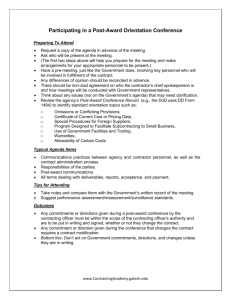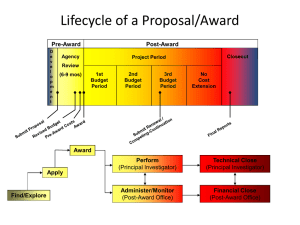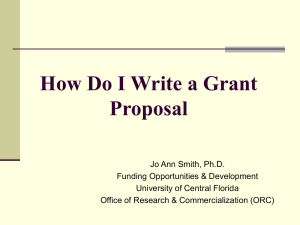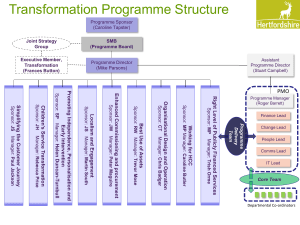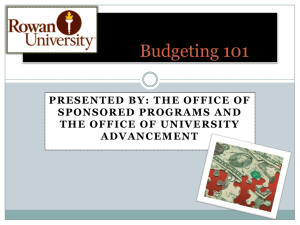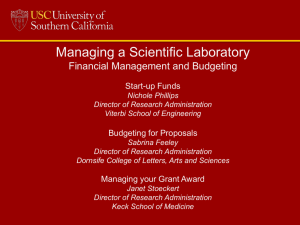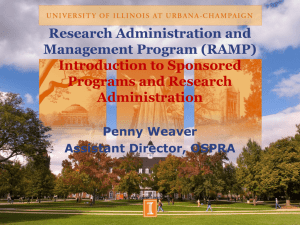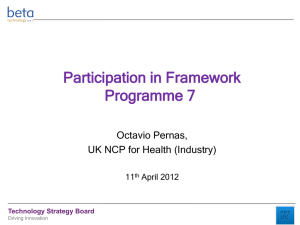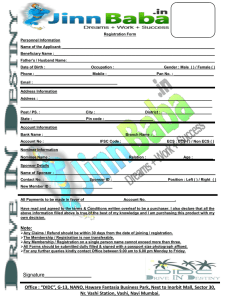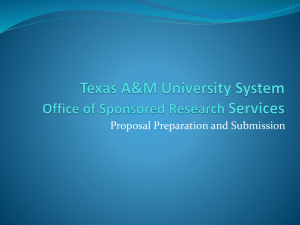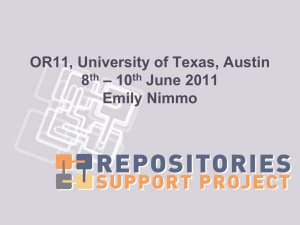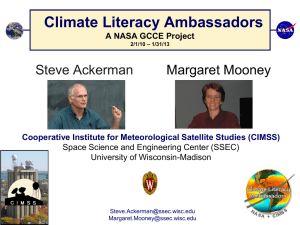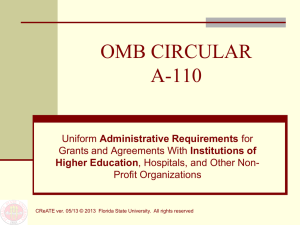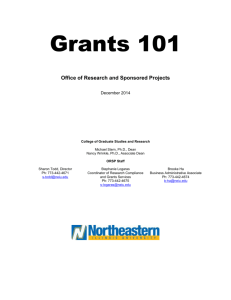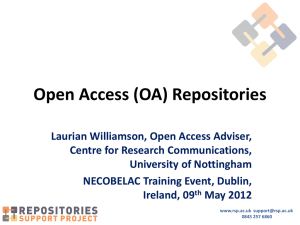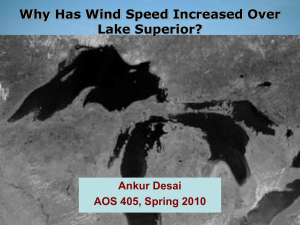Research Administration for Department Administrators
advertisement
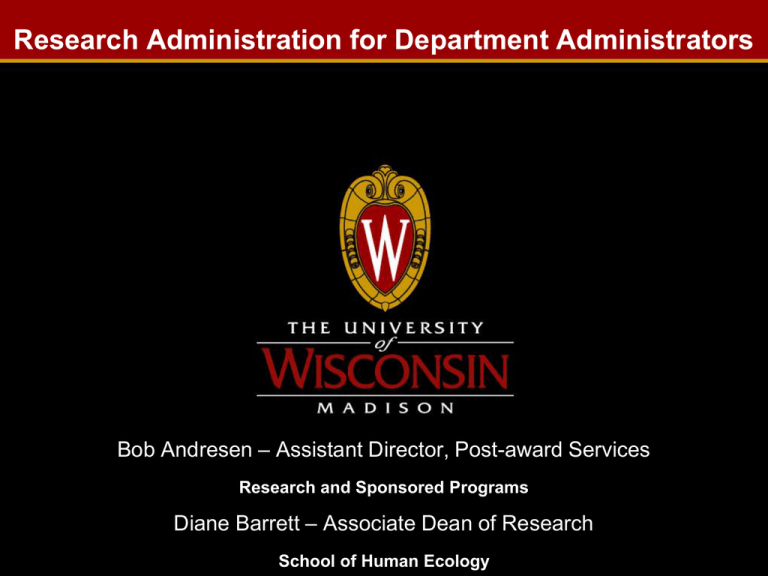
Research Administration for Department Administrators Bob Andresen – Assistant Director, Post-award Services Research and Sponsored Programs Diane Barrett – Associate Dean of Research School of Human Ecology Test Your Knowledge! See True-False Questions In your packet. Give it a try just for fun. Who We Are Who You Are – Pre-award? – Post-award? – Huh? What Are Proposals? Proposals (applications) request support for a defined activity. • Some proposals are abbreviated documents to be used for discussion – Concept papers – White papers • Formal proposals • Some proposals are a two-stage process: – Letter of inquiry (2-3 pages, private foundations) – Preliminary proposals; preproposals (used to screen applications with only some invited into second stage) What Are Proposals: Formal Proposals • Constructed according to guidelines established by sponsor • Follow forms and format required by sponsor – Title/cover page – Abstract – Statement of work – Personnel vitae – Detailed budget with justification – Facilities/resources statement – Appendices What Are Proposals: Formal Proposals • Often 20-30 pages in length • Competition for funding is intense – Federal agencies: often only 20% are funded • Timeframe from proposal submission to response: – Federal may take nine months (or longer) – Other sponsors may take less time Often 2-3 months to write, 9 months until funding outcome, and if not funded, one year lost! Ways We Can Help Write a Proposal • Assist in proposal planning • Produce manuals on proposal preparation • Provide technical editing services • Provide release time to write proposal • Develop boilerplate materials • Provide proposal review/grant writing assistance • Develop pre-filled sponsor forms • Encourage faculty to use colleagues to review drafts Prepare Budget Write Proposal Contact Sponsor Determine Fund Priorities Find Sponsor Document Need Faculty expected to do: Identify Idea We Aren’t Done Yet: BUDGET! research, service, instruction, training • While writing the proposal (application, request for funding), begin working on the budget • Make sure proper sponsor forms and format are being used • Get any compliance needs underway if needed Let’s Talk Budgets in General for a Moment Budget Terminology • Direct costs are those that can be specifically identified with a single sponsored project. – Direct costs should be reflected by major budget categories with an attached narrative detailing how the costs were calculated. • i.e., Salaries/Wages, Fringe Benefits, Contracted Services, Supplies, Equipment, Travel, Tuition Remission, and Participant Support costs. Budget Terminology • Facilities & Administrative Costs or Indirect Costs – Cost incurred by a grantee for common or joint objectives and that therefore, cannot be identified specifically with a particular project or program. • i.e., Lights, Heat, Custodial Service, Library Budget Terminology • Cost Sharing – Salary is the most frequent source of cost sharing. – Cost Sharing is the difference between the effort expended on a project and the effort that is paid by a project. – Cost sharing dollars can only be used once (can’t count the same effort on two grants!) and must be verifiable. – Cost sharing cannot come from federal funds. Remember This: • An uninteresting and poorly thought-out proposal is much more likely to be funded if we throw in lots of cost-sharing. Budget: Things to Think About • Faculty think about: – What salaries do I need • We think about – Non-federal Policies • University policies • State policies • Non-profit policies – What equipment – Do I need to travel – Who else is involved – Industry policies – Federal • Government-wide OMB Circulars, FARs • Cost Accounting Standards • Specific agencies Budget Vignette • “There has never been a soils map made of every national park. I’d eventually like to visit each park and collect soil samples for analysis. I expect this to take the rest of my life, so I am planning to start with parks in the Southwest, beginning in the first year with Arches and Canyonlands. I’m hoping to have 3-4 grad students at a time working with me at the sites, and I’ve been contacted by a potential post-doc that is very excited about helping with this. • Because we need to haul some equipment for analyzing soil samples on-site, and we’ll also need camping supplies and lots of water, which you have to haul into most of Canyonlands, my mentor suggested we do as he did and buy a used SUV that is devoted to the project. Is that possible? Some Marginally Useful Information • Both Parks are near Moab, Utah • Canyonlands comprises 337,598 acres (527 square miles); Arches is a small park but more heavily traveled • The equipment needed is less than $5000 • “Summers” means 3 months” @ 100% • A certain type of assay will have to be done by a firm in Denver • The closest airport is Grand Junction, CO • One of the grad students transferred to your university at the same time the PI did – and has the same last name What Questions Should You Ask? Think about what questions you might want to ask of the faculty member What other questions do you need answered? The Proposal Is IN! Or is it? Chair Chair Sponsors Dean Dean RSP research, service, instruction, training Awards are very competitive. Many Federal agencies are funding in the low 20 percent range and may take 9-12 months from proposal submission until notification. When notification of an award is received, faculty are ready to begin! Award Proposal Submission SP Review Budget Write Proposal Contact Sponsor Determine Fund Priorities Find Sponsor Document Need Faculty expected to do: Identify Idea An Award Is Made! Gifts • 5 Criteria to Define: – Must provide support for broadly defined activities, such as professorships, scholarships, building projects, fellowships, research and instructional programs. The donor may restrict the use of funds to a specific program area or purpose. – No detailed technical or fiscal reports are required as a condition of the gift. – All patents, copyrights and other intellectual property rights that result from activities supported by the gift are not claimed by the donor. – The gift contains no restrictive provisions, such as delays or advance notice concerning publication or dissemination of data and information derived from activities supported by the gift. – The gift is irrevocable by the donor. • Must meet all 5 criteria • Administered in Fund 233 Revenue Producing Activities (aka Fees for Services) • In general, sales of goods or services. – Examples: • Copy centers • Registration fees for conferences • Routine testing • Goods/services sold at a fixed rate. – Rate determined by incorporating all direct and indirect costs associated with providing goods/services. • Most revenues of this type are handled in fund 136. • http://www.bussvc.wisc.edu/acct/policy/rpa/rpapol.html Grants vs. Contracts • Grants • Contracts – Project conceived by PI – PI defines details and retains scientific freedom – Usually fundamental research or institutional research and training – Project conceived by agency – Agency procures service – Agency exercises direction or control – Agency closely monitors – Usually developmental research rather than fundamental • Cooperative Agreements Similar to Contracts, but typically conceived jointly. Post-Award Process • Receive notice of funding/award • Award negotiations with sponsor (as needed) – RSP alerts PI to any award restrictions – “Contracts” require written approval from PI and Dean • Awards accepted by RSP when the following are in place: – Mandatory cost-sharing – Assurance/Clearances – Investigator financial disclosure Post-Award (cont’d.) • Establish project(s) • Monitor expenditures and cost-sharing • Award transfers (as needed) • Financial reports (as needed) • Transfer of funds from agency • Award close-out • Final financial and technical reports Rules and Regulations • Grant/Contract terms and conditions • Sponsor’s general terms and conditions • Office of Management and Budget Circulars (e.g. OMB A-21, A-110, A-133) • Code of Federal Regulations • Federal Acquisition Regulations (FARs) • State of Wisconsin statutes, policies, and procedures. A-21: Cost Principles for Educational Institutions • Establishes principles for determining costs applicable to grants, contracts, and other agreements with educational institutions. • Designed to provide that the Federal Government bear its fair share of total costs. • Guides indirect cost (facilities and administration) rates and time and effort reporting. • Somewhat open to interpretation. Can I Pay Off of My Grant? Cost must be: • reasonable • allocable • allowable • treated consistently • conform to any specific guidance set forth in A-21 Reasonable: Does the cost incurred reflect an action that a “prudent person” would have taken under the circumstances prevailing at the time? Allocable: • A cost is allocable to a sponsored agreement or F&A rate if it is shown that the cost benefits the agreement or the operations of the institution through reasonable methods Allowable: • Must conform to any limitations or exclusions set forth in the cost principles or the sponsored agreement. DOES IT PASS THE SMELL TEST? Would you want to see it on the front page of the Wisconsin State Journal? Post-Award Grant Management Please turn to Professor Smith Questions in your packet OMB Circular A-110 • Purpose - This Circular sets forth the standards for obtaining consistency and uniformity among Federal agencies in the administration of grants to and agreements with institutions of higher education, hospitals and other non-profit organizations • Think of it as the “instruction manual” or “cookbook” for the Federal agencies. Audits required by OMB Circular A-133 • States and local governments and non-profit organizations (including colleges and universities) that receive $500,000 or more in federal funds required to have organizationwide audit. A-133 Audit includes: • Financial Statements • Internal Controls • Compliance Review for Compliance Examples: • Allowable costs and activities • Cash management issues • Effort reporting • Cost-sharing requirements • Financial and technical reporting What if Something Goes Wrong? • PI leaves/dies • PI submits proposal on own • Big-time “misappropriated funds” Avoid these common mistakes: • If the PI is expecting cost sharing from a source on campus (or otherwise) check to make sure it is possible! Cost sharing is auditable and must be documented. • If the project will require human subjects, animal care, biological safety, etc. clearances, work ahead! Committee meetings are sometimes not as frequent as the PI wishes. • Cost/Benefit - does it cost more to do the project than you are receiving from the sponsor? What’s New in Post-Award? • New Grants Management Systems – SFS modules for Grants (including budgeting), Projects, A/R, Billing – UW-built bolt-ons: WISPR and Cost Share – New WISDM views for project financial data. • ECRT: New Effort Reporting System • Business Services migration from legacy systems (A/P, PO, etc.) • Increased External Audits (14 and counting) Meet Professor Grey 42 Meet Professor Grey (continued) • Prof. Grey has been with the University for thirty-four years. • He has been scaling back his extensive research operations in recent years, but plans on continuing research activity for the foreseeable future. • Prof. Grey and the previous research administrator worked very well together for many years. She would frequently complete tasks and sign paperwork for him—often without him having to ask for assistance. • Typical quotes: – “Why are you asking me to do this? – “In my thirty-plus years, I never had to do this before.” – “Where does it say that I have to do this?” 43 The Scenario • Prof. Grey comes to your office with a copy of an email requesting that he certify his effort using the University’s new effort reporting system. • Prof. Grey hands you the email and says: – “Here; you need to take care of this for me today.” • What do you do? Topics for Discussion • Roles and Responsibilities • Effort Reporting • Cost Sharing •I’m doing research at 2 universities but I only want to pay indirect once on my NSF grant. •But I can’t get my budget in early because my research is so cutting edge. How late can I walk it through? (How is your luck?) •I have two federal grants for two separate projects but I keep them completely separate (except for the fact that I only have one lab). Professor Black is in Political Science. He goes to a large conference in his field and happens to sit at lunch next to a Program Officer from XYZ Foundation. Professor Black takes the opportunity to tell Ms. P.O. about a great project he has been thinking about for some time. Being a dynamic and interesting speaker (like all professors), he soon has Ms. P.O. quite excited about his project idea. She tells him to send her a 2-page prospectus with an estimated budget next week after the conference ends. Professor Black cannot believe his good fortune. He rushes back to his office at the University of Uh-Oh that weekend and types up his ideas, dropping them in the mail on Monday morning. He has included a one-line budget of $50,000, which will pay for the survey instrument, mailing, a student to help him, and 2 months of summer salary. Professor White submits a last-minute proposal to you that must be out the door within the hour to meet the deadline. As you look frantically at his budget, you notice that he has included a huge amount of his own cost-shared time. You call Professor White and ask if he really is going to spend 100% of his time for 3 months for the next 3 summers on this project. He says, laughing, “Oh, of course not. You know, you just put that stuff in to make it look good.” What do you do? You have helped Professor Tan with her budget (17 times) for her language center and her proposal was federally funded. You have gratefully passed the folder on to post-award with the hope that you never see Professor Tan again. Several months later, post-award shows you a requisition for $5000 in t-shirts. It is a confirming requisition (the t-shirts have already been ordered) and you are quite sure that those t-shirts were not in the budget to begin with. When post-award calls Professor Tan, she has said that the t-shirts contain the language center’s web address to advertise the center, and she has already received the t-shirts and given them all away at a conference last week. What do you do? What do you do Part I: The Medical School has a trainee who does not speak English well. The Program Director makes a case to you that paying for this student to take English diction lessons will enhance his ability to see patients and is therefore allowable as a trainee cost. What do you do Part II: The Program Director then produces a letter from the Project Director at NIH stating that this is a reasonable trainee cost and is allowable. URLs to Bookmark RSP www.rsp.wisc.edu Medical School Research Administration http://www.med.wisc.edu/research/ URLs to Bookmark CALS www.cals.wisc.edu/research/index.html L&S Research Services www.ls.wisc.edu/research.htm Engineering Financial Services www.engr.wisc.edu/faculty/research.html Contact Us • Diane Barrett – edbarrett@wisc.edu • Bob Andresen – randresen@rsp.wisc.edu
